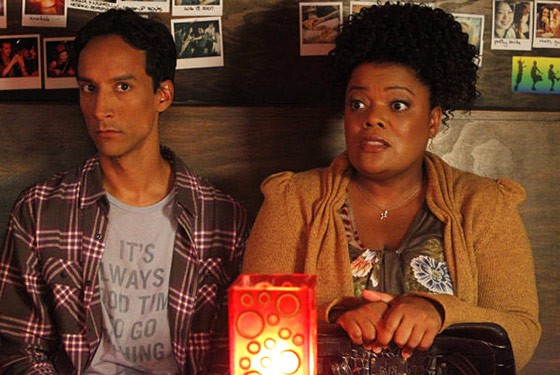
Like vinyl records, world wars, and, from what weÔÇÖve been told, ÔÇ£every story,ÔÇØ there have always been two sides to Community: The much-discussed meta-sarcasm on one and an old-school sitcom sentimental sweetness on the other. In a second season that was front-loaded with the former it was a surprise, and a slightly jarring one, to have a half-hour devoted almost entirely to the latter. Pitched somewhere between a ÔÇ£very special episode,ÔÇØ the last ten minutes of a John Hughes film, and a mid-aughts emo album (quite possibly featuring a cover like this), ÔÇ£Mixology CertificationÔÇØ was an odd bird. What began as a typically merry laughfest celebrating JehovahÔÇÖs Witness TroyÔÇÖs ÔÇ£expulsion from a uterusÔÇØ braked as sharply as JeffÔÇÖs sports car about midway through and ended as an almost entirely different show (one that gets e-mailed the same ÔÇ£acoustic guitar treacle that signifies learning or emotional growthÔÇØ mp3s as the GreyÔÇÖs Anatomy producers, evidently). WeÔÇÖre not saying we didnÔÇÖt like the other show, it just caught us off guard. Kind of like an unfinished mermaid tattoo.
So, the particulars: To celebrate Troys impending manhood (a.k.a. his 21st birthday), the gang takes him out to a bar. Not just any bar, though, because troop leaders/surrogate parents/cocktail poseurs Jeff and Britta cant agree on a locale: He wants to go to L Street but she thinks its douchey; she wants to go to The Red Door, but he thinks its lame and hipstery. Get a room! (Or a backseat with Abed. But thats later.) Instead, they compromise with a place thats divey but not staph infection divey and has a name thats either gross or ironically fancy, possibly both. Wait for it  The Ball Room.
The first trickles of darkness emerge quickly: The bouncer recognizes Shirley and she sets to work removing unflattering Polaroids of her drunk self that are scattered everywhere. But it was hard to focus on how not funny that business was (and how it was supposed to be that way) when there were so many other excellent character beats occurring, particularly Jeff and Britta being those people at a bar (telling Troy he could have any drink he wanted except the ones he wanted), and AnnieÔÇÖs nervous nature taking an innocuous fake I.D. to its (il)logical conclusion. What starts with an awkward (though not Cajun) attempt at a Corpus Christi accent spirals into a full-blown manic panic: Not only did ÔÇ£Caroline DeckerÔÇØ grow up on a trout farm and devote her life to ÔÇ£general waywardnessÔÇØ and following the band Phish (ÔÇ£with a PÔÇØ), sheÔÇÖs also a vessel for Annie to fill with all the frazzled self-doubt and loathing that hides behind her perky exterior. Did we laugh when she confessed to punching her parole officer? Yes. But we also bought the entire transformation.
Less likely ÔÇö but no less amusing ÔÇö was AbedÔÇÖs oblivious flirtation with a gay nerd, played by an uncharacteristically un-suited Paul F. Tompkins. (At a certain point, even emotionally stunted Abed realized the guy wanted to have sex with him. But Abed just really likes talking about Farscape.) But then a particularly hideous photo of Shirley is found in the ladiesÔÇÖ room (ÔÇ£If You Look Like This, Call a CabÔÇØ), and the world pivoted. Shirley had some ÔÇ£bad yearsÔÇØ and she storms off in shame, stopping only to help Pierce whose (tiresome) breath-controlled wheelchair died in the foyer. Troy, finally on the cusp of tasting his first Britt-and-Jeff-disapproved 7&7, surveys the room and sees what many of us who have frequented bars or polar-bear cages after hours have seen: a loud, sloppy mess. Jeff and Britta, the nominal adults, are shouting at each other about reimagining The Hurt Locker as a radio play. After a few tequilas, Caroline Decker is just as sad and lonely as Adderall Annie. And Abed has ice water on his face. Troy leaves his drink untouched and chooses to become a man in the Jewish tradition: a bar mitzvah driving a father figureÔÇÖs sports car without his permission.
And hereÔÇÖs the thing, these characters have surprising depth and little about what happened next felt unearned: that Annie should have complicated feelings about her life, that Jeff and Britt can sometimes be jerks and also not realize that they were fighting about the same bar (and that they would definitely be the friends who start out bickering but end up tonguing in the bathroom ÔÇö or next to Abed, who, by the way, is not a coat rack), and, yes, there is no way that Troy would know who Mark Ruffalo is. But we must say: This You Can Count on MeÔÇôsize lacuna in his memory was the only thing we bought about Troy here. No character has changed more in the course of CommunityÔÇÖs run than the former football star: What started as a onenote jock quickly took advantage of Donald GloverÔÇÖs own personality and his natural chemistry with Danny Pudi to become something sweeter and stranger. But when you spend so much time making a character childlike ÔÇö only a week ago he was building a campus-size pillow fort and dreaming of playing spaceships in cardboard boxes! ÔÇö it takes more than a few minutes in a dreary bar to age him up again. So ÔÇö de DOY ÔÇö we didnÔÇÖt totally buy his anger and sudden-onset maturity. Sorry.
But you know what? ThatÔÇÖs okay. Because the bigger picture here was more impressive. Rather than criticize ÔÇ£Mixology CertificationÔÇØ for its minor faults, weÔÇÖd rather focus on its major virtues. Not many shows could zoom from zombie parodies to bottle episodes to conservative musings on the ravages of alcohol in the span of a month. Furthermore, not many would want to. Community is proving itself to be unique, a well-constructed machine suitable for nearly every comedic climate, condition, or context. And if it took some gloppy acoustic noodling and a designated driver to finally convince us of that fact, then so be it.

